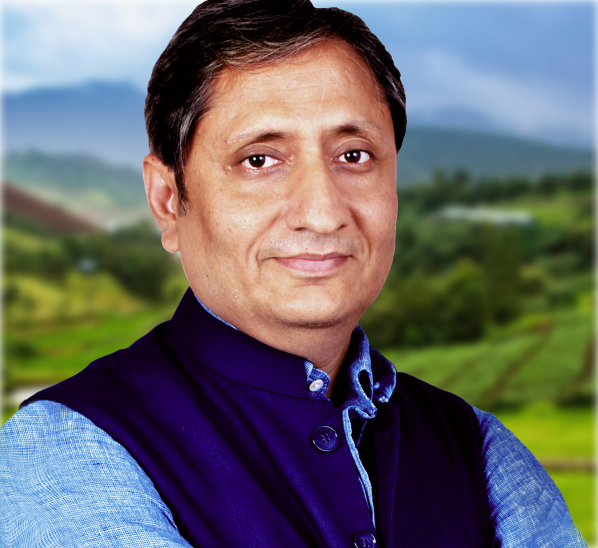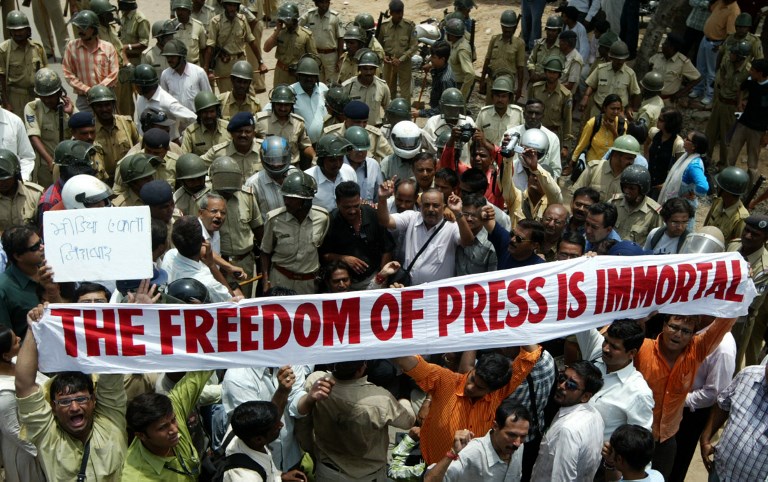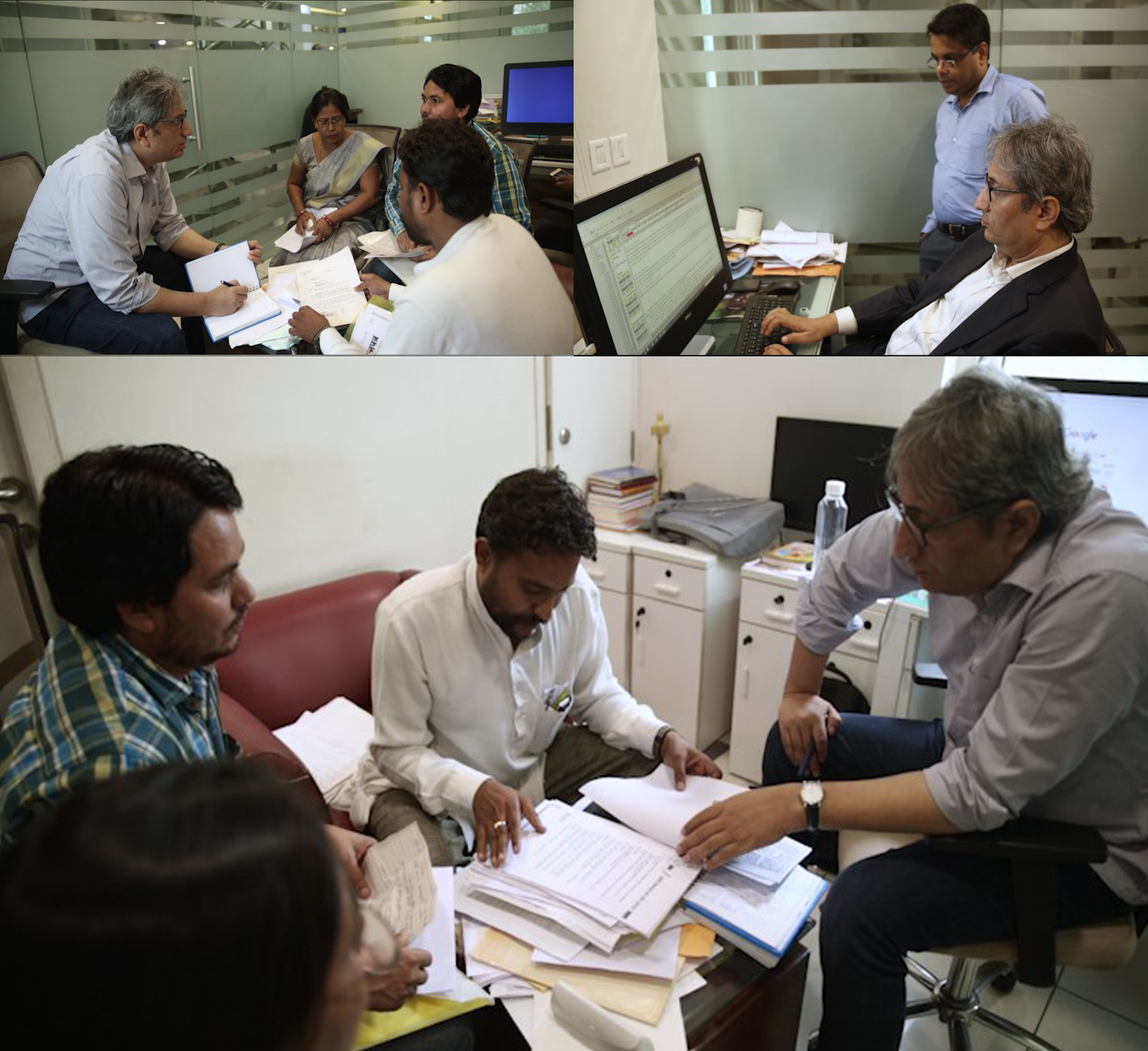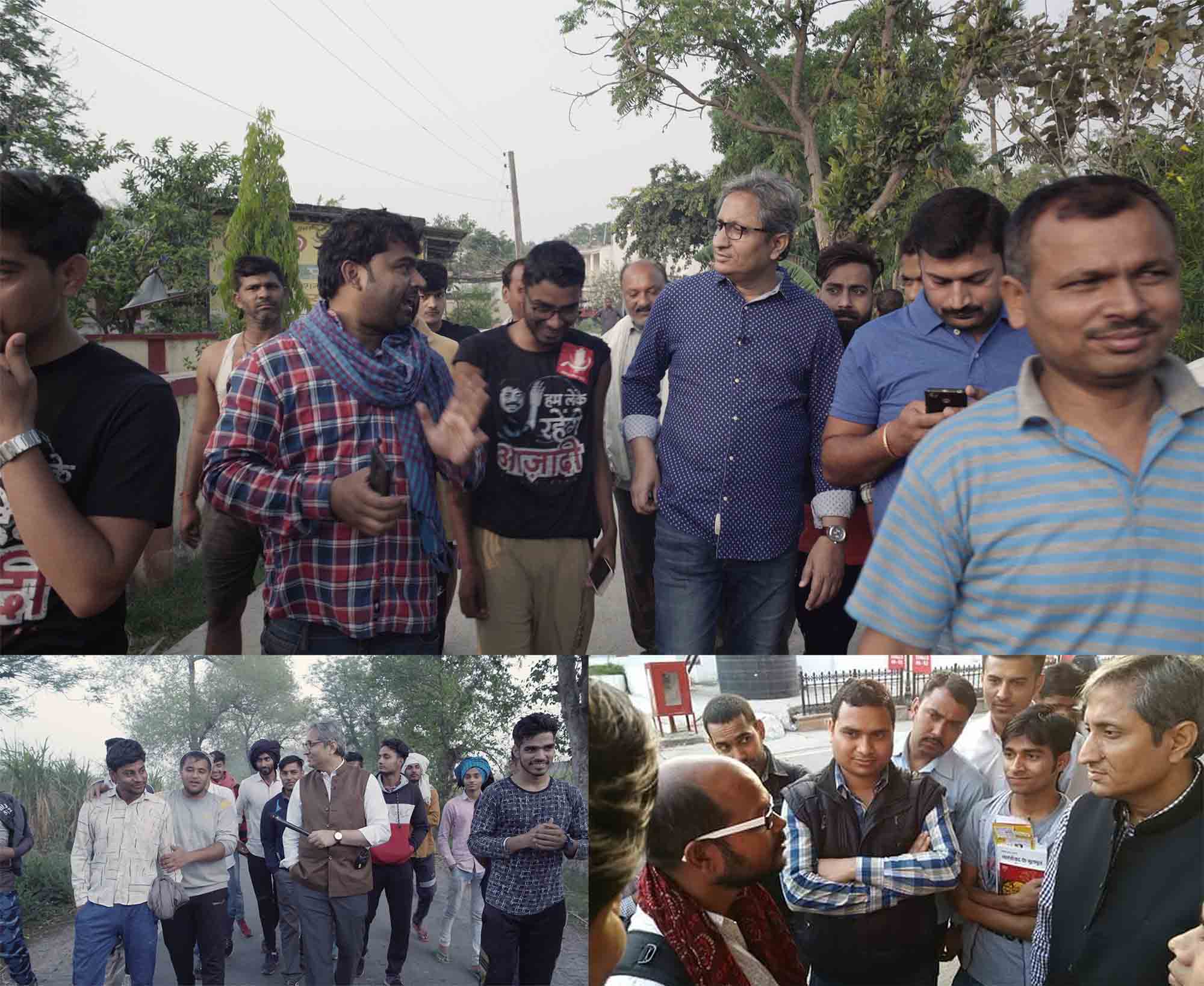An important voice against these threats is television journalist RAVISH KUMAR. Raised in Jitwarpur village in Hindi-speaking Bihar, northeast India, RAVISH pursued his early interest in history and public affairs through postgraduate studies in history from Delhi University. In 1996, he joined New Delhi Television Network (NDTV), one of India’s leading TV networks and worked his way up from being a field reporter. After NDTV launched its 24-hour Hindi-language news channel—NDTV India—targeting the country’s 422 million native speakers of Hindi, he was given his own daily show, “Prime Time.” Today, as NDTV India’s managing editor, RAVISH is one of India’s most influential TV journalists.
His more important distinction, however, comes from the kind of journalism he represents. In a media environment threatened by an interventionist state, toxic with jingoist partisans, trolls and purveyors of “fake news,” and where the competition for market ratings has put the premium on “media personalities,” “tabloidization,” and audience-pandering sensationalism, RAVISH has been most vocal on insisting that the professional values of sober, balanced, fact-based reporting be upheld in practice. His “Prime Time” program on NDTV India takes up current social issues; does serious background research; and presents issues in well-rounded discussions that can run up to twenty or more episodes. The program deals with real-life, under-reported problems of ordinary people — from the lives of manual scavengers and rickshaw-pullers to the plight of government employees and displaced farmers, to underfunded state schools and the inefficient railway system. RAVISH interacts easily with the poor, travels extensively, and uses social media to stay in touch with his audience, generating from them the stories for his program. Striving for a people-based journalism, he calls his newsroom “the people’s newsroom.”
RAVISH is not above engaging in some theatrics himself if he feels it effective, as in an innovative show he did in 2016 to dramatize how debased the discourse had become on TV news programs. The show opens with RAVISH coming on screen to talk to the viewers about how TV news programs had descended into a “dark world” of angry, strident voices. The screen then goes dark and, for the next hour, there is nothing but a cacophonous audio of sound bites from actual TV programs, venomous threats, hysterical rants, the sounds of a mob baying for the blood of enemies. For RAVISH, it is always about the message, dispassionately delivered.
As an anchor, RAVISH is sober, incisive, and well-informed. He does not dominate his guests but affords them the chance to express themselves. He does not balk, however, at calling the highest officials to account or criticizing media and the state of public discourse in the country; for this reason, he has been harassed and threatened by rabid partisans of one kind or another. Through all the perils and aggravations, RAVISH has remained consistent in his effort to preserve and widen the space for a critical, socially responsible media. Keeping faith with a journalism that puts service to the people at its center, RAVISH sums up what he believes a journalist is in the most basic terms: “If you have become the voice of the people, you are a journalist.”
In electing RAVISH KUMAR to receive the 2019 Ramon Magsaysay Award, the board of trustees recognizes his unfaltering commitment to a professional, ethical journalism of the highest standards; his moral courage in standing up for truth, integrity, and independence; and his principled belief that it is in giving full and respectful voice to the voiceless, in speaking truth bravely yet soberly to power, that journalism fulfills its noblest aims to advance democracy.
Inequality is mostly measured in terms of health and economy, but the time has come for us to take cognizance of knowledge inequality as well. When resources for quality knowledge have become confined to a few cities, we cannot even begin to imagine what are the repercussions of this inequality in smaller towns and villages. Clearly, the source of knowledge for a vast multitude is the propaganda machine of WhatsApp university. One cannot entirely blame today’s youth since they have been denied quality education and information. It becomes all the more important to evaluate the crisis of the media in this context. If media too begins to function like the WhatsApp university with fake news and fake knowledge, what then would be the consequences for society? It is a good sign that India’s citizens have begun to understand this. That is why the congratulatory messages that I am receiving are also replete with worries on how the media has turned rogue.
Therefore, while I am happy for myself today I am also filled with sadness looking at the state of the profession I represent.
Indian media is in a state of crisis and this crisis is not accidental or random but systemic and structural. Being a journalist has become a solitary endeavor as uncompromising journalists find themselves being forced out of their jobs by news organizations. Nevertheless, it is heartening to see that there are still some who continue to put their lives and careers at risk to practice honest and meaningful journalism. Some women journalists are speaking out and managing to survive on freelance earning. With the internet still shut down in Kashmir, most major news channels went along with government’s stand. Yet, there are some who have dared to report from within that shutdown and face the wrath of the army of trolls. While institutional journalism is facing a crisis, individual journalists are struggling to survive and question authority.
Can we restore the sanctity of the news? I do hope audiences will once again realize the value of truthfulness in reporting, and the diversity of voices and opinions. Because a democracy can thrive only as long as its news is truthful. I accept the Ramon Magsaysay Award; I accept it on behalf of all those readers and viewers who continue to live in areas of knowledge inequality but have a thirst for good and truthful information and knowledge. Many young journalists realize this challenge. I am confident that in times to come, they will be able to restore the meaning of true journalism. It is possible that they may lose the battle, but sometimes resistance is not a matter of choice. Not all battles are fought for victory—some are fought simply to tell the world that someone was there on the battlefield. I accept this award on behalf of all such journalists.
Related Articles

“Celebrating Greatness of Spirit in Delhi” Honors Six Decades of Magsaysay Awardees in India
Sep 2, 2024





